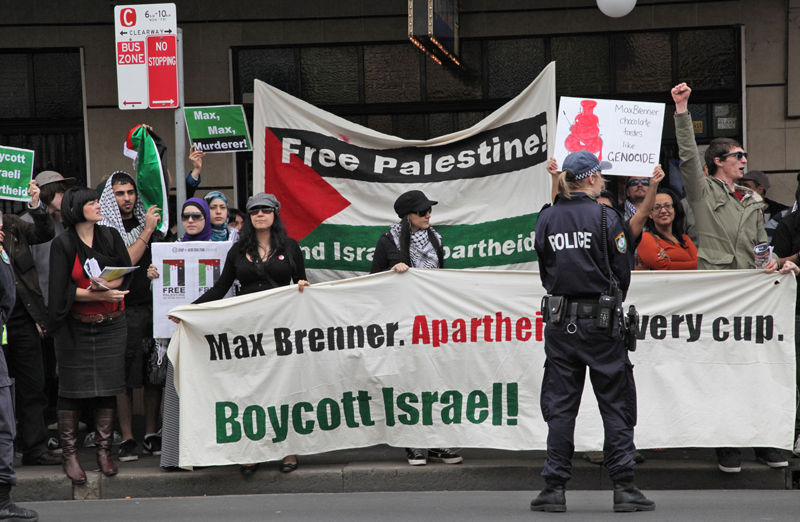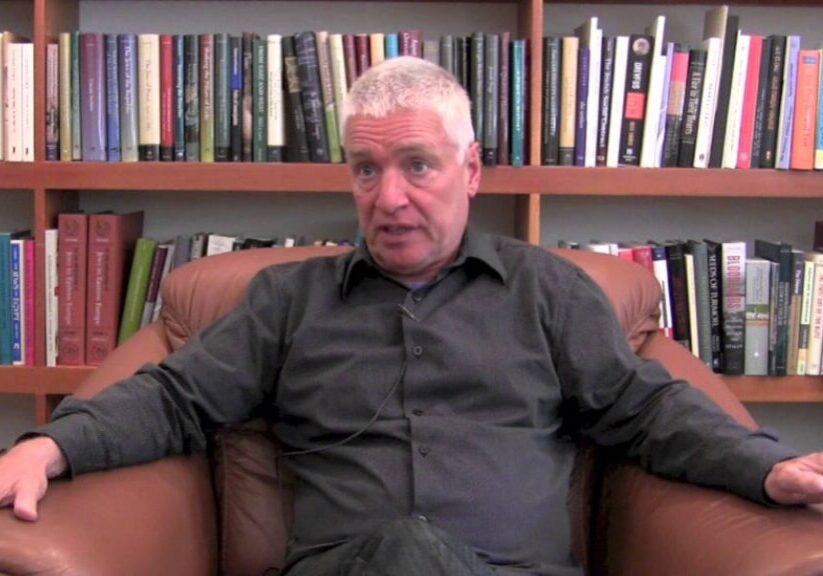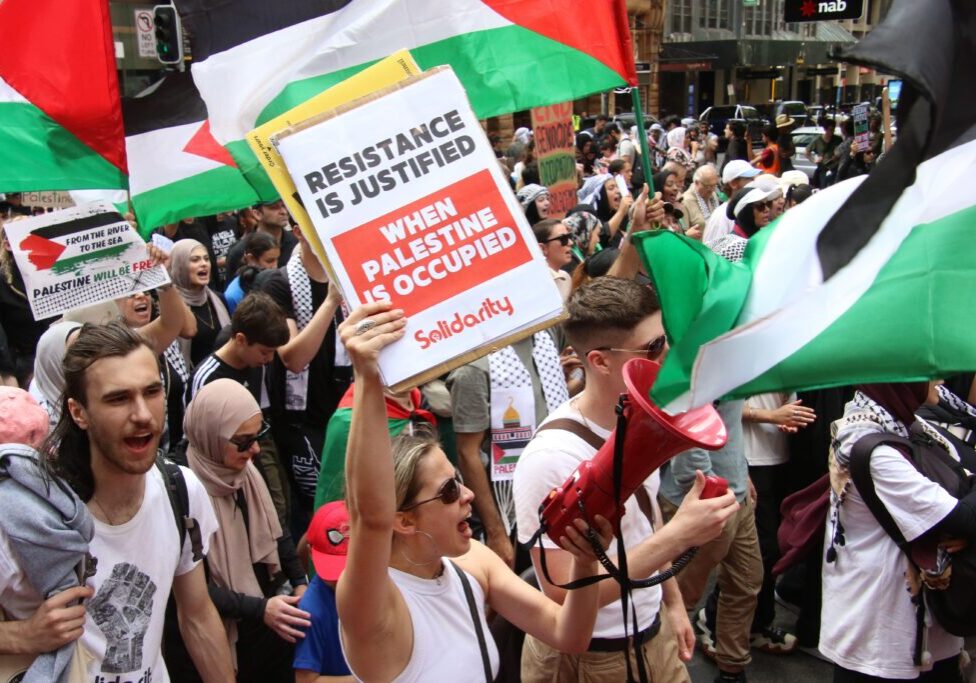Australia/Israel Review
Pretexts and Propaganda
Sep 27, 2012 | Ahron Shapiro

The real agenda of the BDS movement
Ahron Shapiro
Foreign Minister Bob Carr announced on September 13 that the Australian Government “fiercely, unequivocally, strongly oppose” the Boycott, Divestment and Sanctions (BDS) movement against Israel. This followed a Government decision the previous day to oppose supporting a Senate anti-BDS motion advanced by Opposition Senator Arthur Sinodinos (Lib., NSW) on the grounds that it singled out individuals in the Greens party. But Carr’s statement reinforced the broad national consensus against the destructive, anti-peace BDS campaign.
When Australian Greens federal parliamentary leader Christine Milne distanced her party from BDS on the Senate floor and reiterated support for “a two-state solution” for Israelis and Palestinians, the fringe nature of the movement was fully exposed. It lacks public backing from a single federal member of parliament or significant political party in Australia.
In the aftermath of the NSW Greens’ ill-fated Marrickville Council foray of 2011 – a disastrous attempt to impose BDS upon a local council which led to a voter backlash arguably still being felt today – the Greens continue to flee from BDS with the understanding that it alienates potential supporters.
Yet the pariah status of BDS in the halls of Parliament has not deterred its advocates from pressing forward with noxious protests, both here and abroad. And while the protesters serve up any number of contrived excuses to the media why a particular artist or company should be boycotted, it is essentially a smokescreen to obfuscate their true agenda – to target anything and everything Israeli. This article seeks to examine the flimsy and often contrived excuses commonly advanced by the BDS movement for boycotting or protesting specific companies and organisations.
Boycott them all
In Australia, the various pro-Palestinian and radical socialist groups associated with BDS have more famously targeted Max Brenner Chocolate shops. To explain this decision, BDS activists use the excuse that Strauss, the Israeli food company which bought out this chain from its founder, Oded Brenner – has distributed food packages to Israeli soldiers. Efforts are then made to link specific units of Israeli soldiers known to have received food packages to claims of alleged “war crimes”. Never mind that the Australian stores are wholly local-owned franchises, the whole argument that giving food packages to soldiers means complicity in supposed war crimes is pretty fatuous.
Meanwhile, earlier this year, performances at a Shakespeare festival by Israel’s Habima theatre company were disrupted in the UK, the Western epicentre of BDS. Activists there claimed they were objecting to the group having performed at an Israeli West Bank settlement. Yet, just months later, many of those same protesters also attempted to disrupt performances by Israel’s Bat-Sheva Dance company at the Edinburgh International Festival, despite the fact that group had not played in the West Bank. For Bat-Sheva, the protesters conjured up a different offence – that of receiving grants from the Israeli Government and being identified as Israeli cultural ambassadors.
While the reasons BDS gives for waging a cultural boycott against Israel are weak and inconsistent, those given for companies targeted in their consumer boycott are equally absurd and contrived.
The official Australian BDS guide (available for download from the Australians for Palestine website) targets 25 companies for boycott. Some have a connection to settlements and/or Israel’s military occupation of the West Bank, but many others don’t. The guide explains that while settlement boycotts are appealing to some, the ideal is to boycott everything to do with Israel.
“While better than nothing, such [partial] boycotts fail to target the repressive state itself”, the guide reads.
In fact, the 26th company that the guide lists to boycott is not a company at all, but rather the Israeli country code on a product bar code – in other words, any and all products made in Israel.
However, perhaps recognising that simply saying we want to boycott and protest any and all companies with any connection with Israel is not a PR winner, additional justifications for boycotting specific companies are offered. However, as in the Max Brenner case, the pretexts for boycotting the companies the guide singles out stretch the boundaries of both credulity, and frequently, factual accuracy.
Cosmetics company Ahava has been attacked, not only for having a factory near the shores of the Dead Sea in the West Bank – which is at least accurate – but principally for supposedly pillaging “Palestinian” resources in the form of mud and minerals from the Dead Sea for its products. A recent Fairfax media story highlighted a radical Palestinian NGO’s accusation that Ahava was committing a “war crime” in allegedly doing this. However the company has repeatedly denied the allegation that it harvests resources from the West Bank, insisting that it sources all the mud used in its products entirely from Israel’s internationally recognised southern shoreline of the Dead Sea.
To counter these denials, BDS groups offer a FOI letter from Israeli military authorities that says Ahava has a license to harvest mud from the Dead Sea’s West Bank shore, but have produced no evidence that Ahava is actually doing so.
But the reality is that whether they are doing so or not would probably make no material difference to the BDS movement because they also protest Ahava’s competitor Seacret with equal fervour – and this is a company which indisputably sources and produces its products entirely within Israel’s pre-1967 borders.
Meanwhile, Naot sandals are claimed to be targeted for having an outlet store in a Jewish settlement in Gush Etzion.
Non-Israeli companies are listed for various reasons, some both dubious and bizarre.
The French multinational company Veolia is cited for operating a landfill in the Jordan Valley and being involved in construction of Jerusalem’s light rail line. Australian BDS activists claimed a dubious boycott “victory” when the Victorian Government decided against renewing its contract with Veolia subsidiary Connex for operating Melbourne’s suburban trains, ignoring much more important factors such as poor performance and lower bidders.
American earth-moving machinery company Caterpillar is boycotted for supposedly selling bulldozers to the IDF – which the company, by the way, says it doesn’t do. Caterpillar spokesperson Jim Dugan stated “Caterpillar sells equipment to the US government, which then transfers the equipment to the Israeli government, which then transfers it to the Israeli military.”
Moreover, BDS activists ignore the fact that the Palestinian Authority itself buys Caterpillar products.(The hypocrisy of BDS goes back to its roots. One of its founders, Omar Barghouti, lobbies for an academic boycott of Israel while simultaneously studying at Tel Aviv University.)
Another company under boycott, Coca-Cola, is pilloried for being a “staunch Israel supporter since the mid-1960s” (an allusion to Coca-Cola’s defiance of the Arab League’s boycott of Israel). According to the BDS guide, it dared to build a plant in Kiryat Gat “on stolen Palestinian land” (Kiryat Gat is in pre-1967 Israel).
Computer chip maker Intel, the guide says, is under boycott because it “allocates funds to apartheid education” – an outrageous claim local BDSers don’t bother to substantiate. Like Coca-Cola, it is also attacked for having a plant in Kiryat Gat.
BDS targets the Swiss multinational food giant Nestle for owning the Israeli food firm Osem. No other justification is given for including the company in a boycott.
Revlon is listed for boycott merely for its majority-ownership by companies owned by Israel-supporting Jewish businessman Ronald Perelman, who the Australian BDS guide also demonises for being a trustee of the Simon Wiesenthal Centre, which it terms “a notorious pro-Israel front group.” The boycotters’ inclusion of Revlon – a company which has no direct ties to Israel at all – can only lend credence to the accusation levelled by some critics of BDS that it is an inherently antisemitic movement that parallels the efforts of the Nazis to boycott Jewish businesses in the 1930s.
Similarly, Estee Lauder is under boycott for Chairman Ronald Lauder’s connection to the Jewish National Fund, an organisation that is particularly vilified among pro-Palestinian activists for its historical and ongoing role in support of Zionist land purchases and development.
L’Oreal is targeted for having a factory in the Israeli town of Migdal Hatmek (also in pre-1967 Israel) on land that BDS activists claim belonged to Palestinians before 1948.
McDonald’s, the guide says, “through its ‘Partnership to Israel’ program, contributes large sums annually to further illegal settlement development on occupied Palestinian land.” The guide does not substantiate nor elaborate.
Danone is boycotted for entering a joint venture with Eden Springs for bottled water from a source on the Golan Heights.
The activists target Volvo for holding a minority share in Israeli bus manufacturer Merkavim. BDS activists somehow claim these buses, as well as Volvo construction equipment, are actively used in the oppression of Palestinians.
Optus is listed for boycott for ostensibly allowing its products to be used for Israeli military communications in the West Bank.
And the extremely arbitrary list goes on. Tellingly, the BDS guide uses supposedly supporting “occupation” as a pretext for boycotting less than half of the companies on its list (and even in many of those cases, the link is extremely tenuous). The majority of the companies listed for boycott are either Israeli companies with no link to the West Bank whatsoever, or foreign firms who are deemed overly friendly to Israel, or simply associated with prominent Jewish businesspersons with pro-Zionist views.
Background and Goals
Long on hype but short on substance, BDS is clearly modelled on the decades-long Arab League Boycott of Israel that begin in the 1940s. The idea for a Westernised NGO version of this was launched by various, primarily Arab, “NGOs” (many of them actually government supported) at the UN’s notorious 2001 Durban “anti-racism” conference, which turned into an anti-Israel, and often antisemitic, hate fest.
If you read the literature, it is clear the movement is not primarily oriented toward causing economic damage to Israel. It is instead about getting headlines for anti-Israel slogans.
Marking the seventh anniversary of the campaign, the West Bank-based BDS National Committee issued a statement titled “BDS at 7! – Celebrating, reflecting and further mainstreaming” and promised to continue to fine-tune “our strategies to further spread BDS and further isolate Israel as a world pariah, just as South Africa was under apartheid.”
On the issue of its consumer boycotts, the statement had stated: “Popular consumer boycotts of Israeli products and campaigns against companies that export and sell Israeli products, particularly those implicated in Israel’s illegal colonies in the occupied Palestinian territory, have not only raised awareness among ordinary citizens in countless cities across the world but led to significant damage to complicit Israeli companies.”
In other words, the boycotts are intended to inject the language of the anti-Israel narrative into media coverage. Impacting the bottom line for some Israeli companies is merely a bonus.
As prominent Australian BDS organiser Kim Bullimore posted on Australia’s Crikey website last November: “While there is still a long way to go, in just six years the BDS campaign has dented the once unassailable discourse about the ‘Palestine question’ in the corporate media and popular discussion. Today, discourse about Israel is peppered with words such as ‘apartheid’, ‘boycott’, ‘right of return’, something barely heard six years ago, when Palestinian civil society launched the BDS campaign.”
Give them their due. One must acknowledge the dangerous success of BDS in getting media exposure for their anti-reconciliatory narrative. But it has come at a cost.
Despite their stated goals of “mainstreaming” their campaign, the irony of BDS in its seventh year is that, for all its ambitions, it is a self-limiting movement. The bullying tactics that are used by BDS to impose their fringe worldview on greater society and thrust their issue into the media spotlight are, by their very nature, offensive to all but the radicals themselves, as seen by their increasing political isolation.
Moreover, the facts don’t support their slanderous campaign to link Israel to apartheid. For those for whom facts matter – the mainstream – BDS is as flimsy as a sand castle which collapses under the weight of its own lies.
BDS, which is vehemently against the peace process and all forms of peaceful dialogue and interaction between Israelis and Palestinians, also explicitly calls for the so-called Palestinian refugee “right of return” to pre-1967 Israel – a demand which has long been understood on both sides of the Israeli-Palestinian divide as involving Israel’s demographic destruction. While claiming to be “agnostic” over whether Israel has a right to exist (in order to allow support from backers of a two-state outcome), in reality its leaders are uniformly outspoken in favour of a one-state outcome where Israel would be replaced by a Palestinian state with an Arab majority.
This extremism is difficult to sell – which is why the BDS movement makes up flimsy, factually challenged, and absurd justifications for boycotting companies, or tries to relate their boycott campaign to the “occupation” of the West Bank – even though almost all senior activists are opposed to Israel’s existence in any borders.
This is the reality of BDS, something it ultimately cannot disguise, despite the twisting and turning and the dubious and manufactured justifications for various boycotts. Ultimately, the beliefs which are at the very essence of the movement will come through – a global campaign of delegitimisation which is intended to complement ongoing Palestinian armed “resistance” against Israel, prevent a two-state peace and eventually achieve Israel’s demise.
Tags: Anti-Zionism






